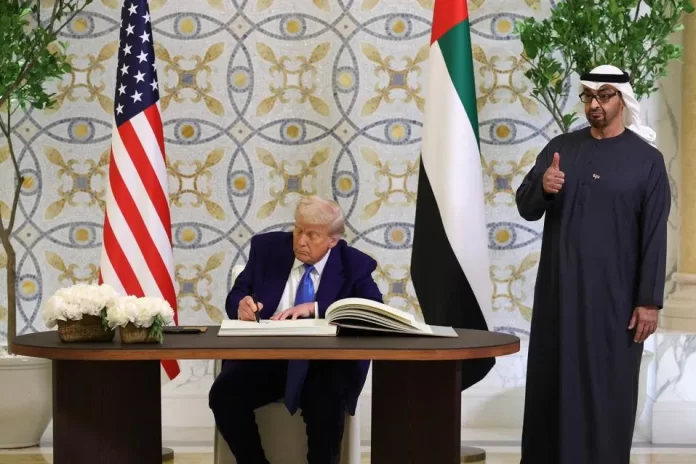
UAE this year orchestrate a remarkable transformation from a traditional oil giant to a competent leader in the global digital economy. The push? AI and crypto, leveraging the nation’s favorable policies and strategic geographic location while the two biggest economies in this world are at odds.
Despite their individual strengths, AI and blockchain are increasingly interlaced, both striving towards systems that offer better autonomy, transparency, and data-driven intelligence, reshaping industries through their combined innovative potential. This drive will largely help the UAE capitalize on their complementary advantages to rewrite the global economic and technological race during this time of uncertainty.
To know how the UAE is playing their range, we must look differently through the lens of Dubai and Abu Dhabi, the two iconic sites that share responsibility for the nation’s strategic ascent to leadership in Web3 and AI.
Dubai: Agility, Commerce, And Global Hub Aspirations
Dubai’s strategy is characterized by its emphasis on agility, a strong commercial focus, and a clear ambition to be a global hub for FinTech, AI, and Web3. It leverages its established reputation as a business-friendly environment with world-class infrastructure, together with its latest push to build supportive regulatory frameworks to attract innovation, talent, and capital.
- Agile Regulatory Environment: Dubai’s VARA (Virtual Assets Regulatory Authority) is known for its pioneering role as the world’s first independent, purpose-built regulator for virtual assets. Its key strengths lie in its friendly and clear regulatory framework. The clarity comes from its activity-based rulebooks which provide specific, yet adaptable, guidance on various virtual asset services like exchanges, custody, and advisory. This systematic approach, coupled with active industry engagement, provides businesses with a predictable and supportive environment to operate, attracting significant investment and talent.
- Startup Launchpad and Web3 Hub: Dubai’s strategic location, coupled with its supportive ecosystem, makes it an ideal launchpad for cutting-edge technologies. It boasts 800 AI companies, 66% of which are using Dubai as their global hub. As of 2024, Dubai hosts over 700 blockchain companies, with the blockchain market in the MENA region projected to grow to $40 billion by 2027. The Dubai AI and Web3 Campus also issues AI and Web3 licenses for activities such as Distributed Ledger Technology Services and AI Research.
- D33 Agenda: Dubai’s Economic Agenda (D33) is an ambitious 10-year economic plan, with the primary goal of doubling Dubai’s economy by 2033 to AED 32 trillion ($8.7 trillion) and consolidating its position among the top three global cities. The agenda encompasses 100 transformative projects focusing on diverse sectors like technology (AI, Web3), financial services (FinTech, Islamic finance), logistics, tourism, and advanced manufacturing.aims to place the emirate among the top four global financial hubs by 2033.
Abu Dhabi: Institutional, Research, And Strategic Infrastructure
Abu Dhabi’s strategy is more geared towards a top-down, institutional approach, emphasizing foundational research, advanced technology development, and the establishment of strategic, large-scale infrastructure projects. It aims to become a global leader in AI and institutional-grade digital assets through significant government investment and fostering deep partnerships.
- Institutional Drive and Government Digital Transformation: The “Abu Dhabi Government Digital Strategy 2025-2027” aims to make the emirate the world’s first fully AI-native government across all digital services by 2027. This strategy involves deploying AED 13 billion (approximately $3.5 billion USD) between 2025 and 2027 to foster innovation and technology adoption. It seeks to achieve 100% adoption of sovereign cloud computing for government operations and digitize and automate 100% of processes, with over 200 innovative AI solutions planned for implementation.
- Research and Talent Development: The Mohamed bin Zayed University of Artificial Intelligence (MBZUAI), where I was a visiting scholar this spring, is the world’s first university dedicated solely to AI. The Advanced Technology Research Council (ATRC), which oversees the Technology Innovation Institute (TII), is engaged in developing advanced technologies like quantum computing and AI, including Falcon AI models. The “AI for All” program aims to democratize access to AI and ensure that the benefits of this technology are shared by all citizens, not just a select few.
- Strategic Infrastructure and Large-Scale Investments: A significant initiative is the UAE-US AI campus in Abu Dhabi, the largest AI campus outside the United States. Additionally, Abu Dhabi’s MGX fund has made substantial investments in global AI ventures, including a $30 billion AI infrastructure fund with BlackRock and Microsoft, and a $1.5 billion investment in G42, a leading UAE AI company. MGX also became an initial funder of OpenAI’s $500 billion U.S. AI infrastructure project.
- Institutional-Grade Digital Assets Infrastructure: Abu Dhabi is meticulously constructing an institutional-grade ecosystem for digital assets, focusing on regulatory clarity, secure custodial solutions, and direct integration with traditional finance. This approach aims to provide the necessary confidence and infrastructure for large-scale institutional adoption of crypto and blockchain technologies. It is being built through a combination of forward-thinking and robust regulation from ADGM.
To conclude, this dual approach allows the UAE to capitalize on a broad spectrum of opportunities in the global digital economy. As for the long-term results, questions that remain to be asked include:
- What happens when the subsidies inevitably scale back?
- Are there enough local educational pathways producing genuine innovators, or is it heavily reliant on expatriate talent?
Source: Forbes



